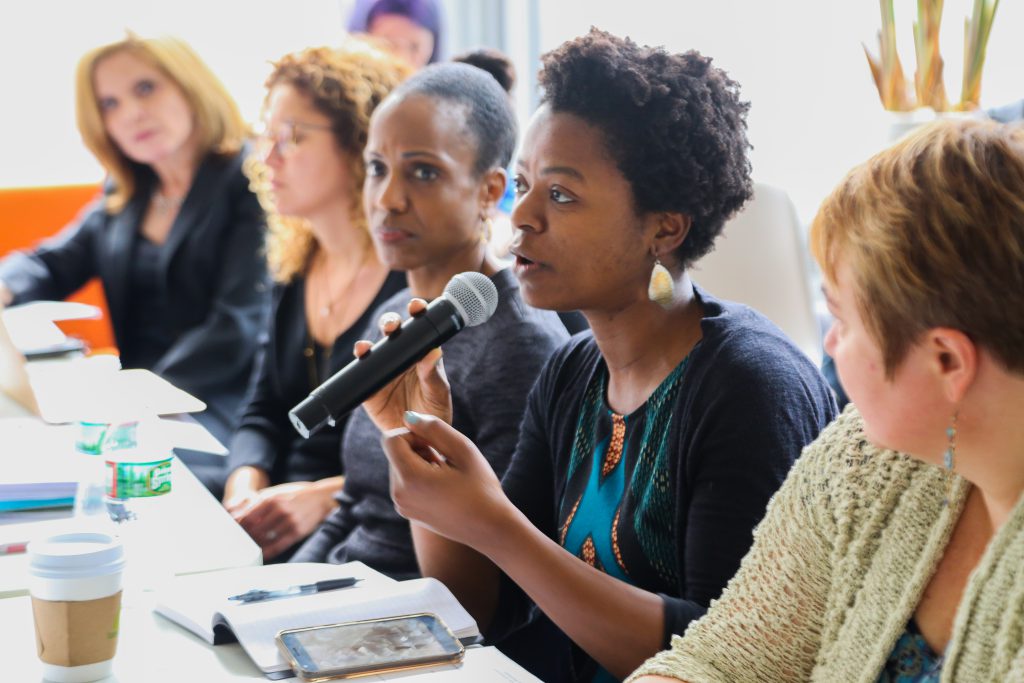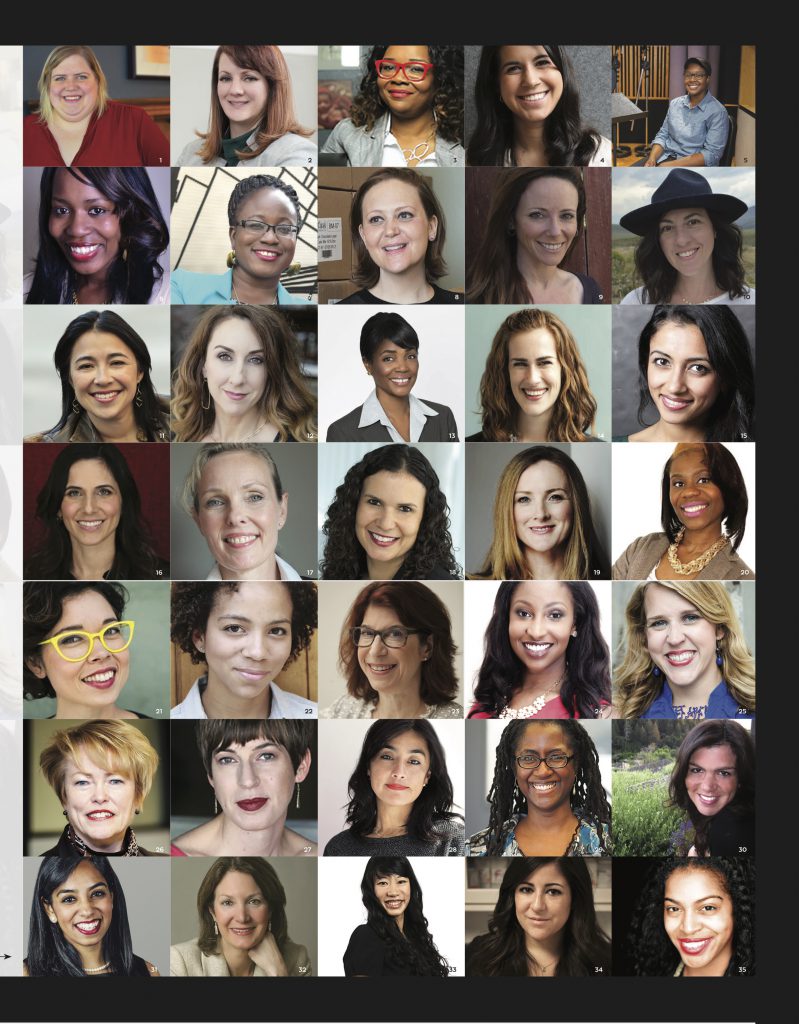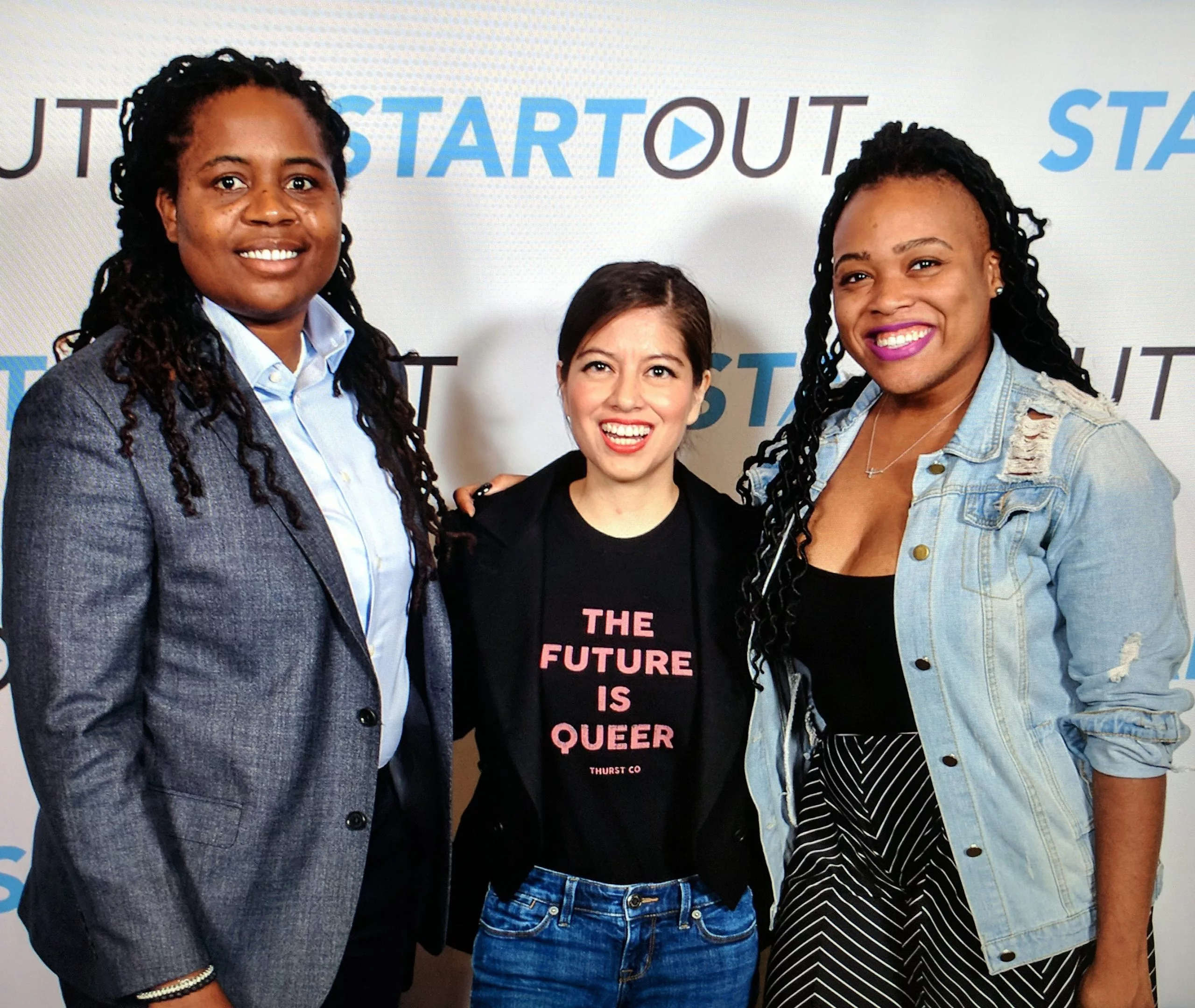“Who do you want to make money for?”
That’s the central question Natalia Oberti Noguera wants to make sure everyone is thinking about — from the social entrepreneurs she advises to the impact investors she trains, and everyone else who buys things (which means, well, all of us).
In her speeches and writing, Oberti Noguera is a bountiful source of insightful one-liners and provocative straight talk. She’s constantly challenging those around her to notice their unconscious biases. Case in point: while working on this article, we asked Oberti Noguera to share her height and age. She, in turn, pushed us to reconsider our framing of her size (petite and 5’2”) and age (35 this August) as surprising markers of a leader. She mentioned AARP’s campaign to #DisruptAging, and AllGo, a Pipeline Angels portfolio company (more on that later) that’s working to create a more accessible world for fat people.
“Why do we think that conscious leadership is going to look the same as traditional leadership?” she asked. “We’re still seeking legitimacy by the signals out there, the status quo, what we’ve been told. Several sources state that the average height of Fortune 500 CEOs is 6’2”. I’m sure that what keeps it there is a self-perpetuating cycle of people hiring based on what they think a leader looks like. This is why we need to actively work to expand that perception.” Point taken.
Her company, Pipeline Angels, aims to do just that type of perception expanding. Its story begins in 2008, when Oberti Noguera used an email list and Eventbrite (woman-led; she checked) to launch a network of female social entrepreneurs in New York City. Within two years, as the community grew from six women to over 1,200, Oberti Noguera began noticing a common struggle: it was seriously hard for these business leaders to raise capital. Meanwhile, high-profile raises by well-known companies with, as she puts it, “white-guy founders,” were all over the news. She also saw fewer early-stage individual impact investors — what the tech startup world calls angels — than she wanted.
So in 2011, she launched Pipeline Angels via what would become the company’s signature program: an angel-investing bootcamp for anyone identifying with womanhood (cis, trans, or third gender). “I’m on a mission to change the face of angel investing,” she says. “We’re creating capital for women and non-binary femme social entrepreneurs.” Pipeline Angels recruits and trains those who might invest in such entrepreneurs.
Since its inception, the program has graduated 300 members who have invested more than $5 million in more than 50 companies via the group’s pitch summit process.
We recently corralled the jet-setting Oberti Noguera for several hours of wide-ranging conversation about her work and her vision for the world. Here’s what she revealed.
Let’s start with the basics. How does Pipeline Angels work?
Natalia Oberti Noguera: Our members are the friends and family round for entrepreneurs who might not have critical early capital support. Our bootcamp has three main components: education, mentoring, and practice.
For the education piece, we hold workshops led by experts on various topics such as portfolio strategies, measuring impact, valuation, due diligence, term sheets, and exit strategies. I like to call it the book-smarts part of the program.
The second component is the mentoring. We connect our members with seasoned angel investors who can share best practices and best mistakes.
And then we’re huge believers in learning by doing. So one of our signature events is a pitch summit; 8 to 10 entrepreneurs get to present a five-minute pitch to our members followed by a 10-minute Q&A, and then we invite the entrepreneurs to stay for lunch. At the end of that day, I facilitate a debrief, and the members decide on three or four companies to consider investing in. Those move forward in the due-diligence process, and then we have a final entrepreneur interview a few weeks later. The members select at least one company to invest in.
By the end of the bootcamp, I’m cheekily saying our members have earned their wings. For the majority of them, this is the first time they’re making an angel investment.

Pipeline Angels member Opé Bukola at 2018 Pipeline Angels New York City pitch summit. Photo by Kat Araujo
Why create a special investment pipeline by and for people identified with womanhood?
NON: Around 2012, a very well-known white guy investor in Silicon Valley was interviewed at a tech conference, and he was asked, “What do you look for when you invest?” He said very nonchalantly, “Someone like me.” This was before pattern recognition and pattern matching became super trendy terms.
I wanted to turn the issue of pattern recognition on its head and say, “Well, if we invest in what’s familiar, if we invest in what looks like us, let’s get more of us on the investing side, because we’re probably going to be more open about investing in more of us on the entrepreneurship side.”
Marian Wright Edelman says “You can’t be what you can’t see.” We are literally changing the face of angel investing, and changing the stereotypes. When people hear the words men and money, they’re like, “Sharks. Financiers. VCs. Businessmen.” These are very different words than when people hear women and money; that’s like: “Philanthropists. Donors. Charity.” Those are great things. At the same time, guess what? Women and femmes can also be sharks, financiers, businesspeople, VCs, and angels.
I launched Pipeline Angels in April 2011, and later that year I was invited to attend a meeting of an angel-investing group. There were 22 people in the room — 19 white guys, a black guy, a white woman, and me. They were deciding whether to invest in a startup.
This is going to get very heteronormative, so brace yourself. They were going around the room saying things like, “Well, my girlfriend and her friends think we should do this,” “My wife and her friends think we should do that…” It was obvious that the expertise and networks of these women were in the room, but who wasn’t in the room? The women themselves.
I got really excited witnessing this: “This is exactly why Pipeline Angels needs to happen. We’re on the right track because Pipeline Angels is about bringing these women into the room.”
Why focus on investing in, as you put it, “women, non-binary people, and men of color”? That’s essentially everyone except white men. Why explicitly leave them out?
NON: Pipeline Angels member Asha Collins says “The opposite of discrimination is justice.” What we’re talking about here is economic justice. Investing and entrepreneurship opportunities have historically been benefiting straight white guys. I’m asking: how can we talk about wealth building in a way that is more inclusive?
A quote I learned from Rachel Sklar, co-founder of TheLi.st, is: “Privilege is like oxygen. You don’t realize it’s there until it’s gone.” If someone’s benefiting from the status quo, it’s hard to create an incentive for them to want to be part of the change.
What do people need to know about angel investing?
NON: This is where my lawyer would say, “Pipeline Angels is not an investment advisor, financial advisor, or a legal advisor.” With that out of the way, it’s helpful to ground it in the funding continuum. As Nicole Sanchez, CEO and founder of Vaya Consulting, points out, “The tech media glamorizes ‘bootsrapping,’ while for a lot of our communities, it’s simply called living.”
The next steps of funding beyond bootstrapping are the family round, the angel round, and the VC round. The reason the angel round is after and separate from friends and family is that angels tend not to know the entrepreneur and may invest a larger amount. Pipeline Angels members are the friends and family round for entrepreneurs who don’t have that early critical capital support.
The difference between angel and VC investing is that angels invest their own money, VCs invest other people’s money. Some VCs are also angels, and vice versa. It’s important to remind people that angel investing is high-risk.
Who makes a good Pipeline Angel?
NON: We have two use cases. The first one is individuals who are familiar with Shark Tank, or who have gone to a local angel group. They have found that these local angel groups tend to be predominantly white and/or male, and have not felt really welcomed in those spaces. In addition, the deal flow is usually later-stage than ours, and the investment focus of these groups isn’t something they’re gravitating toward.
What they like about Pipeline Angels is it’s like a sisterhood. It’s this welcoming, warm, friendly environment, a very safe space to learn.
Also, our deal flow is entirely women- or femme-led, for-profit social ventures. My friend Vanessa Hurst says, “Shouldn’t doing good be the only way to make a profit?” And yet a lot of people still think about it in a binary way: “Make, make, make money, and then donate.”
The second use case is someone who maybe hasn’t ever come across the term angel investing. What they are is active philanthropically, or in community service, or they’re super volunteers.
One of my favorite definitions of angel investing is that it’s smart money, meaning that it’s not just the financial capital, it’s also the human capital and the social capital — human capital in terms of skillsets and experience, and then social capital in terms of connections and networking.
Sometimes I’ll be provocative, especially for that second demographic. I’m like, “You’re already doing two out of the three. That’s called volunteering and community service.” I encourage and challenge them to add the third. Write that checkto these startups, these social enterprises that are looking to do well and do good and that are led by women and femmes.
Our members are late-20s to over 60, multi-ethnic, multiracial, with different backgrounds in terms of industries and professional experiences. We are curating these diverse cohorts so that the whole is bigger than the sum of its parts. We are interested in people who gravitate towards group learning.
What’s your advice for angel investors?
NON: Especially during the due-diligence process, really, really get comfortable with the difference between what you need to know and what would be nice to know. People are super curious. There are infinite questions that could be asked. Honor the entrepreneur and the entrepreneur’s time. There might not be an answer to all your due-diligence questions, and it’s okay if there aren’t answers. Identify your deal-breakers. In angel investing, these can be super-early-stage companies. What do you need to know and what do you want to know?
I’m also hugely passionate about activating local capital for local entrepreneurs. Some of the places I really want to launch are New Orleans and Anchorage, and other places that are not necessarily getting the spotlight. Some entrepreneurs aren’t wanting, willing, or able to go to Silicon Valley, and if there’s local capital, why should they?
How does Pipeline Angels decide where to expand/spread?
NON: It’s not a cookie-cutter method. Each city has its own culture, its own way of being. For me, connecting with local influencers, establishing those bridges and that rapport is really important.
At the same time, I am a huge believer in the power of early adopters. Generally, we have about five investors-in-training in a cohort, but when we launched in Miami last year, and when we launched in Minneapolis this spring, we had two or three members in our inaugural cohorts. The reason it makes sense to launch with two members is because we need to show the minimum viable product. By having that pitch summit, by having that program, it’s like, “You know what? We did it. Our local members invested in a company,” and then we have those local members helping us continue to grow for the next semester, and so forth.
We just announced we’re launching in Puerto Rico. But anyone who’s an aspiring angel investor who’s like, “You know what? We need you in Tampa,” or, “We need you in blank” — email info@pipelineangels.com. Let us know that you’re interested in us heading there and then we can start the conversation, because that’s really the first part of it.
What are myths that you see out there that you’d like to bust?
NON: I already talked about “Who is an angel investor?” The other side of the equation is, “Who could get support from angel investors?”
Our members often are the first angel in their community. They become these hubs. And their network includes entrepreneurs who maybe have a scalable business that could benefit from angel and VC financing. They just didn’t even realize that that was an option. So having one of our members become known as an angel investor in their own community is helping to dispel some myths about who could be an angel investor and who could get funding from one.
How is what you’re doing for entrepreneurs — say, your pitch events — different?
NON: People have often said that the traditional VC and angel world is very opaque. I’m a visual person, so I’ll give you an example. Picture closed mahogany doors and the entrepreneurs lined up, and then they go one by one through these doors, and then they go out one by one, and you don’t really know what’s happening inside. I wanted to create more of a collaborative, transparent process. This goes back to conscious leadership and how we want to change both systems and processes.
We also invite the entrepreneurs to stay for the whole day. And even for the ones who don’t secure funding, we want to make sure that the feedback they’ve gotten from our members has been valuable.
In addition, they’re getting to meet other entrepreneurs. We often hear that entrepreneurship can be lonely. We’re creating a community. We’ve also had some B2B transactions happen
ing. And then they get to see each other pitch, and so someone might be like, “Whoa, I really liked that competitive landscape slide, maybe I should think about incorporating that into my own presentation.”
What’s exciting is that for the majority of entrepreneurs applying to a Pipeline Angels pitch summit, it’s the first time they’re stepping up to a plate to pitch.
Who’s Who
Meet the entrepreneurs (and companies) Pipeline Angels has funded. Photos courtesy of the founders: (1) Rebecca Alexander, AllGo (2) Crystal Icenhour, Aperiomics (3) Whitney Beatty, Apothecarry (4) Kate Woska-Sirtori, Atikus (5) Morgen Bromell, Thurst (6) Catherine Mahugu, Soko (7) Helen Adeosun, CareAcademy (8) Diana Lovett, Cissé (9) Cat Berman, CNote (10) Jen Gurecki, Coalition Snow (11) Jean Miller Truelson, Dogpatch Technology (12) Chantal Pierrat, Emerging Women (13) Sumayah Jamal, ENB Therapeutics (14) Nicole Van Der Tuin, First Access (15) Rachna Govani, Foodstand (16) Saskia Sorrosa, Fresh Bellies (17) Gitte Pedersen, Genomic Expression (18) Tanya Van Court, Goalsetter (19) Jane Barratt, GoldBean (20) Patrice Darby, GoNanny (21) Sarah Shewey, Happily (22) Melissa Hanna, Mahmee (23) Carol Barash, Story2 (24) KJ Miller, Mented (25) Courtney Jones, MomSource (26) Marie Wesselhoft, MSDx (27) Ursula Hessenflow, myLAB Box (28) Leslie Ali Walker, Need/Done (29) Charlene Brown, ReciproCare (30) Lauren Gropper, Repurpose (31) Amrita Saigal, Saathi (32) Brooke Wentz, Seven Seas Music (33) Steph Speirs, Solstice (34) Kina McAllister, StemBox (35) Cheraé Robinson, Tastemakers Africa

Some of the entrepreneurs Pipeline Angels has funded. See above for their names.
What conversation is not happening in the conscious business world that you think we need to be having?
NON: While social entrepreneurship existed before it was called that, in terms of the branding and feeling like a field, it’s newer than other industries — and yet we’re repeating the same mistakes. Why does it have to be mostly white guys? Shouldn’t we be correcting these things from the beginning?
A few years ago, the Aspen Institute invited me to be part of a delegation of Colombian diaspora entrepreneurs and investors. By the way, I’m a queer cis Latina. My gender pronouns are she/her. I have tons of labels I use. I did not realize that “part of the Colombian diaspora” could be one of them.
We went to Bogotá and Medellín and we checked out some accelerators and incubators. They invited me to speak. The majority of the audience were, once again, guys. Afterward, so many of the entrepreneurs, particularly the women, would swarm and say, “We need Pipeline Angels right now in Colombia. We need your help.”
This white woman from one of the international groups, not from Colombia, approached me saying, “Because angel investing is still super new in Colombia, I don’t think it makes sense for Pipeline Angels to come here yet, because there still isn’t an angel-investing ecosystem.”
And I was like, “Well, this is exactly why we should hypothetically be here, because if it’s still nascent, how amazing would it be that this angel-investing ecosystem starts off diverse, starts off inclusive?” — versus this concept that it needs to start predominantly with guys, because those were the ones in the room, and then we’ll think about opening the doors to more people. The gaze she gave me, it was almost like there was this light bulb I had turned on.
The reason I’m bringing this up is because there are so many amazing things regarding conscious leadership, and we are doing a disservice to this conscious movement to not do things better the first time around.
We also have to push on what impact investing means and what social entrepreneurship could mean. If queer, trans, black women founded a very simple dating app, I would count that as social entrepreneurship. Hopefully there’s an exit, and we’re able to create wealth — because at the end of the day, that’s what investing is about: wealth creation. Wealth creation should be not just for the investors; we should make sure the entrepreneurs and the founders are part of that equation. So for me, even if it’s a dating app, the fact that we’re creating wealth in a super-marginalized community — that’s impact investing.
What’s been your biggest failure in this journey? Your best mistake?
NON: Last summer, I spoke at a conference called Tech Inclusion, and Emily Ladau, a disabled white woman who’s a disability advocate, brought up an important point during the Q&A: when we talk about inclusion, disability does not often get talked about. She asked us on the panel, “Do you have any people who are disabled on your team?”
I was like, “Is this a place there could be more room for improvement?” At the time, we had a part-time paid opportunity, and so I made a specific note encouraging people of color who are deaf or hard of hearing to apply. There was like one random direct message that I got from a person saying she’s queer, Deaf, indigenous, Black, a woman. And I remember telling my colleague, “Oh, my gosh, I think we are getting trolled. This is too good to be true. This is too much diversity in one person.” It turns out that Anisa Flowers is real, and she is phenomenal.
A month or so later, we had our first in-person Pipeline Angels team meeting that Anisa joined. It was a dinner at a sustainable, woman-led restaurant. I had found the one black, female ASL interpreter in San Francisco. I was like, “Awesome. Check, check, check.”
The next day, Anisa told me, “By the way, Natalia, that was not a Deaf-friendly restaurant.” It hadn’t been a round table, and apparently round tables make it easier to see and communicate, and the restaurant had dim lighting, which made it more difficult to lip-read, to see people’s expressions, and for the sign language. I felt so disappointed. Here I thought we had done all these great things, and then I find out that, no, it had sucked.
Not long after, I ended up interviewing Ellen Pao, who was kind of the leading edge of the #MeToo movement, about her book “Reset” and her lawsuit against Kleiner Perkins. I shared this story with her, and she said, “Anisa told you. You created a culture where she felt comfortable telling you, and that is, in some ways, just as important, if not more.”
It reminded me of Maya Angelou’s quotation — now that I know better, I do better. As you can imagine, as we’re thinking about our next Pipeline Angels team dinner, I’m keeping these things in mind. However, if Anisa had not been part of the team, had not been in the room, as a hearing person, I might not ever have had a reason to know or learn, because the world’s default setting is for hearing people. That’s a hugely important and underrated part of what diversity and inclusion is supposed to be about. So many of us don’t have the same experience. The world is not treating us the same.
That would be my current best D&I mistake. That experience has been powerful because it’s such a tangible example of how having someone with a different life experience adds to the team. When the most marginalized are leading, that’s when inclusion happens.
What’s giving you hope?
NON: That there’s still stuff to learn. I recently found out about Micky ScottBey Jones and her poem “Invitation to a Brave Space,” for example. There’s so many people out there doing great work. If I can be part of amplifying what they’re doing, if I can be part of helping to center the margins, that’s exciting, and that’s reenergizing, and that gives me hope.




